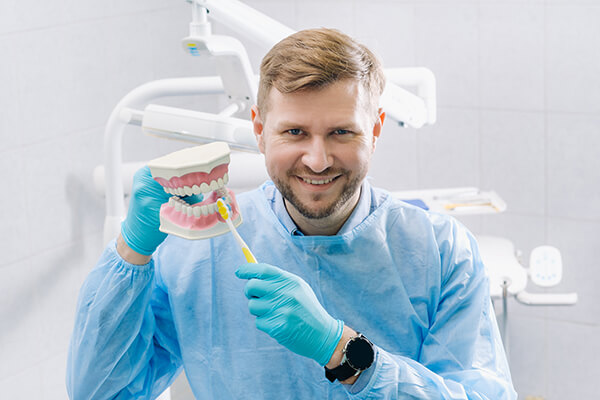A Guide to Usual Oral Conditions That Require a Dental practitioner's Care
Understanding the variety of dental conditions that necessitate expert care is critical for keeping optimal oral health. Toothaches, for instance, can be symptomatic of extreme problems such as tooth cavities, split teeth, or abscesses, each calling for particular interventions like fillings or origin canals. Gum condition, from the very early phases of gingivitis to a lot more severe periodontitis, underscores the significance of normal oral examinations and cleanings. Additionally, influenced knowledge teeth and jaw problems can introduce significant discomfort and difficulties. Ensuring timely visits to the dental expert can mitigate these concerns efficiently, but just what are the therapies and indications included?
Toothaches
Toothaches are a typical oral problem that can range from moderate pain to extreme pain, commonly showing an underlying concern that requires professional attention. This discomfort can come from a variety of sources, consisting of dental cavities, split or fractured teeth, and dental abscesses. Each of these conditions presents significant dangers if left untreated, potentially bring about more extreme problems.
Oral tooth cavities, also understood as cavities, are caused by the buildup of plaque that erodes tooth enamel, leading to openings or pits in the impacted teeth. Abscesses are unpleasant infections at the origin of a tooth or in between a tooth and the gum, commonly resulting from severe degeneration or without treatment cavities.
Efficient treatment of toothaches includes resolving the origin. This may consist of dental fillings for cavities, crowns for split teeth, or root canals and antibiotics for abscesses. Very early treatment by a dental specialist can stop further wear and tear and minimize discomfort, guaranteeing ideal dental health.
Gum Tissue Illness

The key reason of gum disease is microbial plaque, a sticky, anemic film that constantly creates on teeth. Poor dental hygiene, cigarette smoking, genetic proneness, and certain clinical problems, such as diabetic issues, can exacerbate the risk of creating gum tissue condition. Normal dental exams are vital for early discovery and administration of this condition.
Therapy for gum condition ranges from expert oral cleaning and scaling to more innovative procedures like origin planing and periodontal surgical treatment, depending upon the severity. Preserving excellent oral health practices, including cleaning twice daily, flossing, and using a disinfectant mouth wash, can considerably decrease the danger of gum tissue illness and promote healthier gums.
Cavities
Tooth cavities, also referred to as cavities, are a common dental problem characterized by the devastation of tooth enamel due to acid-producing germs in the mouth. These germs grow on sugars and starches from food and beverages, creating acids that slowly deteriorate the enamel, causing cavity formation.
Early-stage tooth cavities may disappoint symptoms, but as they advance, they can trigger toothache, level of sensitivity to hot or chilly, visible holes or pits in the teeth, and staining. If left see this page untreated, cavities can permeate much deeper layers of the tooth, possibly causing severe discomfort, infection, and also missing teeth.
Avoiding cavities includes a combination of great oral health methods and nutritional routines. Routine cleaning with fluoride toothpaste, flossing, and routine oral exams are essential. Dentists may likewise advise added safety nets, such as fluoride therapies and oral sealers, to secure teeth from degeneration.
Small cavities can be addressed with dental fillings, which recover the tooth's structure. Much more sophisticated situations may call for crowns or even origin canal therapy if the degeneration has reached the tooth's pulp.
Impacted Knowledge Pearly Whites
Impacted knowledge teeth are a prevalent dental concern that takes place when the third molars, generally referred to as knowledge teeth, fail to fully emerge or straighten appropriately within the mouth. This problem commonly results from not enough space in the jaw or an uncommon growth angle of the teeth. Influenced wisdom teeth can cause a variety of problems, consisting of pain, infection, and damages to surrounding teeth.
When wisdom teeth come to be affected, they are often partly erupted or continue to be totally below the periodontal line. This partial eruption can develop a pathway for microorganisms to enter the gums, leading to infections that manifest as swelling, pain, and also fever (dentist in eugene oregon). In addition, impacted wisdom teeth can apply stress on bordering teeth, possibly causing crowding or changing
An extensive dental evaluation, commonly including X-rays, is important for diagnosing impacted knowledge teeth. Regular dental check-ups are advisable to check the problem and keep oral health.
Jaw Problems
Conclusion

Dental cavities, likewise known as decays, are caused by the accumulation of plaque that wears down tooth enamel, leading to openings or pits in the impacted teeth. Abscesses are agonizing infections at the root of a tooth or between the periodontal and a tooth, commonly resulting from extreme degeneration or untreated dental caries.
Influenced wisdom teeth are a prevalent oral problem that occurs when the 3rd molars, typically referred to as wisdom teeth, stop working to fully emerge or align properly within the mouth. Affected knowledge teeth can lead to a range of difficulties, including discomfort, damages, and infection to nearby teeth.
Furthermore, influenced knowledge teeth can exert stress on bordering check that teeth, potentially causing crowding or changing.